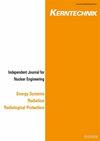DT燃料ITER中杂质和热噪声对辐射源的影响
IF 0.4
4区 工程技术
Q4 NUCLEAR SCIENCE & TECHNOLOGY
引用次数: 0
摘要
摘要本文研究了轫致辐射损耗、等离子体频率和电子粒子密度的时间演化,以及这些参数与黑体辐射的关系。本文所使用的模型是基于DT燃料ITER中粒子和能量平衡方程的数值解。聚变反应发生在氘和氚的等离子体中,加热到数百万度。预计在这个温度下,热噪声会对等离子体的行为产生显著的影响。本文首次在方程求解中考虑了这一效应。为了得到一组合适的粒子和能量平衡方程,在一组耦合微分方程中考虑合适的热噪声项。这些方程用数值方法同时求解。对弱致辐射损失、等离子体频率、黑体辐射强度、吸收系数和质量因子的计算结果表明,在没有热噪声的情况下没有黑体辐射,而在有热噪声的情况下,考虑杂质和不考虑杂质时黑体辐射的次数分别为55.7 s和42.73 s。可以看出,随着杂质的加入,系统的轫致辐射和黑体辐射强度增加,吸收系数和品质因子降低。本文章由计算机程序翻译,如有差异,请以英文原文为准。
Role of impurity and thermal noise on the radiation sources in ITER using DT fuel
Abstract In this paper, the time evolution of bremsstrahlung radiation loss, plasma frequency and electron particles density and the relationship between these parameters and black body radiation are investigated. The model used in this work is based on numerical solution of particle and energy balance equations in ITER with DT fuel. The fusion reaction takes places in a plasma of deuterium and tritium heated to millions of degrees. It is expected that at this temperature, the thermal noise could have a significant effect on plasma behavior. This effect is considered in the solution of equations for the first time in this work. In order to attain a proper set of particle and energy balance equations, an appropriate thermal noise term is considered in the set of coupled differential equations. These equations are solved simultaneously by numerical methods. The results of the calculations for bremsstrahlung radiation loss, plasma frequency, intensity of blackbody radiation, absorption coefficient and quality factor show that in the absence of thermal noise blackbody radiation doesn’t occur but in the presence of thermal noise blackbody radiation occurs in times of 55.7 s and 42.73 s for two cases of considering and ignoring impurity respectively. As it can be seen that with the addition of impurities to the system, bremsstrahlung radiation and intensity of blackbody radiation increase while absorption coefficient and quality factor decrease.
求助全文
通过发布文献求助,成功后即可免费获取论文全文。
去求助
来源期刊

Kerntechnik
工程技术-核科学技术
CiteScore
0.90
自引率
20.00%
发文量
72
审稿时长
6-12 weeks
期刊介绍:
Kerntechnik is an independent journal for nuclear engineering (including design, operation, safety and economics of nuclear power stations, research reactors and simulators), energy systems, radiation (ionizing radiation in industry, medicine and research) and radiological protection (biological effects of ionizing radiation, the system of protection for occupational, medical and public exposures, the assessment of doses, operational protection and safety programs, management of radioactive wastes, decommissioning and regulatory requirements).
 求助内容:
求助内容: 应助结果提醒方式:
应助结果提醒方式:


